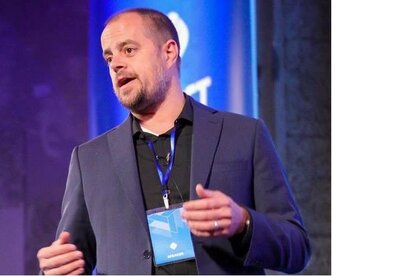On 30 January 2018, the Enhancing Youth Employment (EYE) project in Kosovo supported the Kosovo Manufacturer’s Club to hold a conference on the economy’s missing welders. This happened in an elegant hotel with training institutions, metal processing companies, government officials, donors and consultants… but no welders. We’ve all seen events like this – they typically help a project spend money and create the appearance of progress while achieving little else. That’s not what we do on EYE, but we held this conference because we wanted to see people argue over why an economy with sky-high unemployment and adequate training institutions could not produce enough welders.
The discussions were contentious. The opinions were forceful. The solutions were…. not remarkably clear, but we weren’t expecting clear solutions. Instead, we wanted to find multiple opportunities for breaking this odd stagnation. We wanted a good kind of noise – and we got it.
The background
The labour system in Kosovo is unsuccessful in matching the supply of qualified workers with the demand for skilled labour. Government data indicates that about 30% of the active workforce is unemployed, and about 57% of young workers (ages 15 to 24) is unemployed. There are also strong disparities between male and female unemployment and unemployment among majority versus minority populations. Official data is likely an overestimate, given strong local incentives away from, and a lack of enforcement for, job formalisation. Nonetheless, these are significant figures even if exaggerated. This is especially true when considering that around 80% of working age women are not officially participating in the formal labour force.
Despite this staggering level of joblessness, representatives of Kosovar and multi-national firms complain about the difficulty of finding adequately skilled labour. They hire unqualified workers and invest heavily in training, leave some positions unfilled, import workers, or invest in other countries to fulfil capacity demands. This affects the speed with which firms can shift tactics and strategy and expand their operations. It also affects the pace at which clusters of complementary and competing firms can arise, since businesses heavily investing in training are more likely to offer a large salary increase than see a staff member leave to start a new business in the same subsector. In a country with tremendous unemployment, there is stiff competition for highly skilled workers.
From a systems perspective
We live our lives surrounded by, and contributing to, complex systems. This is a good thing. Imagine every product and service we use in one day where we live – bed sheets, car parts, electricity, laptops, sunglasses, cell phones, water, roads, clothing, cutlery, etc. If someone had to purposefully plan to make each of those things (most of which are combinations of things) available for us, it would be a disaster. We’d have to make do with two pieces of toilet paper and a cup of rice. The fact that systems do this on their own is the reason we can gather in large groups (like cities) and not starve (usually). This is the miracle of complex systems. When large numbers of people get together, a system self-organizes to accomplish tasks that keep the group alive. In a human socio-economic system, the great achievement is matching supply and demand. It’s the result of a self-organized process whereby agent behaviours coordinate without the central authority to achieve the allocation of resources across a population. [1]
To be sustainable, systems that self-organize also have to continually adapt to changing circumstances. What was useful yesterday may not be useful today, and probably won’t be useful tomorrow. Adaptation requires a few things, but mostly good information (what’s the threat?) and the ability to adapt in light of that information (what do we do about it?).
The same goes for cities and countries. When individuals and institutions communicate and adapt quickly to changing conditions, the system tends to produce greater benefit for its agents. If agents and institutions are unwilling or incapable of adapting, the system performs poorly – if the system is stuck in place, it can’t adapt.
Back to the welders
So, this is the problem Kosovo faces with the market for welders – companies and training institutions don’t communicate with each other enough. Trainers also don’t offer enough services (like internationally recognised certifications). Companies also won’t hire people until they’re qualified, but no one wants to sign up for training unless they have a job. The list goes on…
More generally, the vocational training system is stuck in place. From a systems perspective, information does not move freely, accurately and completely around the system, because of a lack of interaction between all of the actors, but also because some actors benefit from the lack of change. By pulling a lot of the actors into a room to argue over the problem, we found new leads for addressing the issues (the “death by a thousand cuts” approach to development) and also inserted a bit of needed energy into the stagnation. In other words, the discussion generated a good kind of noise – a disruptive, provocative pressure.
We also achieved government buy-in to expand certification authority at training institutions and identified willing business partners to pilot risky strategies for hiring new staff before they’re qualified. Lastly, we made sure that everyone who attended the conference walked out with the contact information of every other person there, and we’ll call around after a month or two to see whether people came up with unexpected opportunities to address the lack of qualified welders. The best solutions to complex problems are often those that no one would expect.
Additional sources:
- On systemic approach: what it is and what it is not
- Navigating complexity
- The road to adaptive management: Knowledge, leadership, culture and rules
- Emerging impacts in using a systemic approach to enhance youth employment
- Inception – using systemic approach to influence behavior through media
[1] Fairly, all economic systems probably achieve this at a somewhat “sub-optimal” level. Poverty persists, after all. But there are varying degrees of “suboptimal” – Kosovo’s workforce development system seems to fall at the extreme end of that scale, as judged by its ability to benefit the population of agents.



